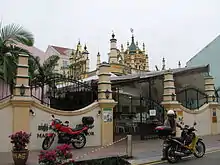Masjid Hajjah Fatimah
The Hajjah Fatimah Mosque (Malay: Masjid Hajjah Fatimah, Jawi:مسجد الحاجة فاطمة) is a mosque located along Beach Road in the Kampong Glam district within the Kallang Planning Area in Singapore. The mosque was designed in a mix of Islamic and European architectural styles, and completed in 1846. The mosque is named after an aristocratic Malay lady, Hajjah Fatimah, who commissioned its construction.[1]
| مسجد الحاجة فاطمة Masjid Hajjah Fatimah Hajjah Fatimah Mosque | |
|---|---|
 | |
| Religion | |
| Affiliation | Islam |
| Location | |
| Location | 4001 Beach Road Singapore 199584 |
| Geographic coordinates | 1.302889°N 103.862806°E |
| Architecture | |
| Type | Mosque |
| Style | Eclectic |
| Completed | 1846 |
| Designated as NHL | |
| Designated | 28 June 1973 |
History

The building of the mosque was initiated by Hajjah Fatimah, who was originally from a wealthy Malaccan family. She married a Bugis prince from Celebes who ran a trading post in Singapore. However, her husband died while she was still young, and she continued to run his business after his death, acquiring a large fortune with her ships. In the late 1830s, her house on Java Road was broken into twice, and set on fire on the second time. Hajjah Fatimah however was away when the arson attack occurred and was therefore unharmed, and to express her gratitude for her safety, she instructed the building of a mosque on the site where the house once stood.[1]
The mosque was designed by an unnamed British architect. It has been suggested that the minaret was designed by John Turnbull Thomson due to a perceived similarity to the design of the first spire of St Andrew's Cathedral, there is however no evidence for this.[2][3] The mosque was built in 1846. The resulting tower leans slightly (around 6 degrees) off center.[1]
After Hajjah Fatimah's death, her business passed into the family of Syed Abdul Rahman Alsagoff, whose son Ahmad married Hajjah Fatimah's only child, Raja Siti. Her qabr (Arabic: قَـبـر, grave) is located in a private mausoleum in the Mosque, together with those of her daughter and son-in-law.[1]
The main prayer hall was rebuilt in the 1930s, based on design by architects Chung & Wong, and constructed by French contractors Bossard & Mopin with Malay workers. The rebuilding added more Islamic elements to the mosque, giving the mosque a mixture of styles.[2]
Masjid Hajjah Fatimah was gazetted as a national monument on 28 June 1973.[2]
Today the mosque is owned by Majlis Ugama Islam Singapura (MUIS).
Architecture
Masjid Hajjah Fatimah contains within its walled compound a prayer hall, a mausoleum, the quarters of an Imam, an ablution area, several annexes and a garden. The building style is eclectic, perhaps its most unusual feature is a distinctive minaret designed in a European style with Doric pilasters, in direct contrast to the Islamic dome above the prayer hall. The tower leans about six degrees off centre due to moisture seepage, shifting of bricks used in the construction of the tower, and the sandy soil on which it sits.[2][4] The minaret is flanked by two houses in European style but with Chinese features, for example in its windows and woodwork.[3]
There are five bays in its façade; the largest central one flanked by miniature minarets is the entrance to the prayer hall. A large onion dome is located above the prayer hall behind the facade. The prayer hall is skewed from the street grid to face Mecca, and is surrounded by verandahs on three sides. It has 12 lancet windows with yellow and green stained glass, and the 16 ribbed sections forming the dome are visible within the prayer hall.[1]
References
- Singapore's 100 Historic Places. National Heritage Board and Archipelago Press. 2002. p. 30. ISBN 981-4068-23-3.
- "Hajjah Fatimah Mosque". Singapore Infopedia. National Library Board.
- Jane Beamish; Jane Ferguson (1 December 1985). A History of Singapore Architecture: The Making of a City. Graham Brash (Pte.) Ltd. pp. 58–59. ISBN 978-9971947972.
- "Masjid Hajjah Fatimah". Roots. National Heritage Board.
External links
| Wikimedia Commons has media related to Masjid Hajjah Fatimah. |


